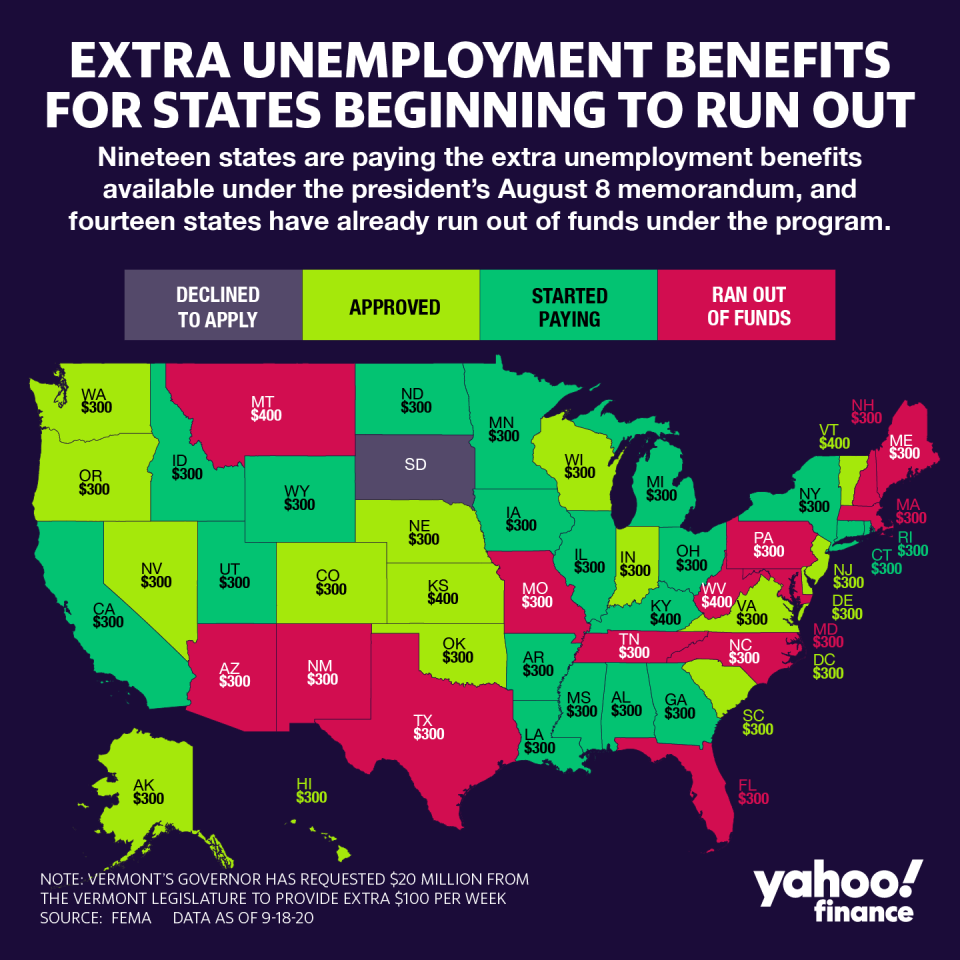Poverty groups brace for influx of need as extra unemployment benefits expire
After the extra $600 in weekly unemployment benefits expired, President Trump took executive action to redirect $44 billion from FEMA to fill in some of the gaps left behind.
But even $44 billion can go quickly during a pandemic.
Arizona and Tennessee are just a couple of the states that opted in early to the Lost Wages Assistance (LWA) program created by Trump’s executive memorandum. They gave their unemployed citizens an extra $300 per week, but the money is already gone for them and the impact is starting to be felt on the ground.
“We're gearing up for the end of the month” said Mary Hamlett, a vice president at the Metropolitan Inter-Faith Association in Memphis. The expected need “just overloads what we have available” she added during a recent Yahoo Finance appearance on Friday.

Hamlett’s group was founded in 1968 after Martin Luther King Jr. was assassinated in Memphis. Citizens and clergy people came together in the aftermath to try and address things like racial inequality and poverty in their city.
This year, Hamlett’s group has seen a steady rise as the pandemic has worn on. Before the pandemic fully took hold, her group was taking in about 127 requests per week for help with rent or utilities. By the end of August, that number had jumped to 906 per week.
“You can see how much the need has increased” she said.
The situation in Arizona
The situation is similar in another state where the additional assistance recently went away: Arizona.
“I have a fear about the end of the year” said Cynthia Zwick, who runs an anti-poverty group called Wildfire based in Phoenix. She sees a “huge gap that's building.”

Arizona’s regular unemployment payment is $240 a week, so the extra $600 from March to July and the extra $300 more recently made a big difference.
In recent weeks, Zwick has seen “an uptick in the number of people seeking assistance of all kinds.”
Many critics of enhanced unemployment say that the increased benefits encourage people not to work, but Zwick said many people she works with “have this huge debt” that has built up as the pandemic has worn on. Even if they can find work in the months ahead, it will be a deep hole for them to dig out of.
“We're going to be seeing people moving in with family members, if they have them, or friends if they have to,” she predicted about the weeks and months ahead. “The worst fear is that we're going to see many more people on the streets.”
‘Many more people on the streets’
According to the National Council of Nonprofits, which represents both Metropolitan Interfaith and Wildfire, nonprofits across the country are facing huge spikes in demand for their services. They also note that non-profits themselves — which have had some troubles accessing PPP funds — are at risk of closing down.
Already, more than 1 million nonprofit employees have been laid off. The Council’s member association in South Carolina estimated that 29% of nonprofits in the state could not survive until the end of the year without additional financial support.
Since unemployment funding under the CARES Act expired in July, negotiations for additional stimulus in Washington, D.C., have basically gone nowhere. The Council has outlined a series of priorities for the next round of stimulus, including both a continuation of unemployment benefits and changes to the Paycheck Protection Program.

If, as many are now expecting, the negotiations remain stalled and both sides push talks until after the November election, millions of jobless Americans in all 50 states could see their benefits drop.
For Hamlett, and the people she represents in Memphis, the question will be how long the economic dislocations will last. “I don’t think we’ll be at the finish line with this on January 1,” she said.
Ben Werschkul is a producer for Yahoo Finance in Washington, DC.
Read more:
Coronavirus stimulus: White House backs $1.5 trillion package as GOP leaders silent on any deal
‘Something's going to snap’: Nonprofits face falling revenue and increased demand
Read the latest financial and business news from Yahoo Finance
Follow Yahoo Finance on Twitter, Facebook, Instagram, Flipboard, LinkedIn, YouTube, and reddit.

 money
money 
